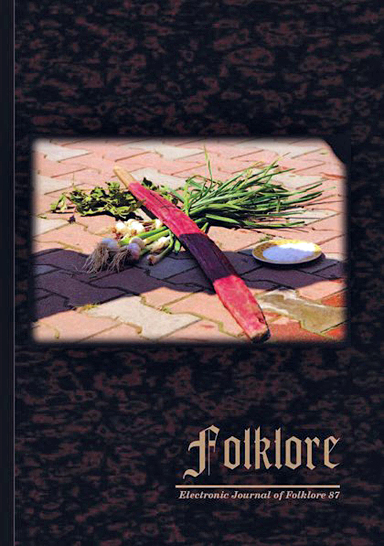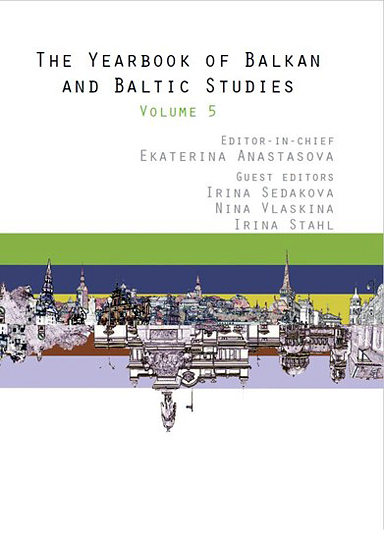
Working Group Ritual Year
Working Group Ritual Year
The WG Ritual Year has several news items: The 9th edition of The Ritual Year seasonal webinars; celebrating Emily Lyle, founder of The Ritual Year Working Group; the 10th International Conference Synergies in Communication; collaboration with the International Association of Agricultural Museums;extended deadline for Edinburgh Myth/Ritual conference: 1 July 2023!

The 9th edition of The Ritual Year seasonal webinars
The RY WG's seasonal webinars series, started during the Covid-19 pandemic, has reached the 9th edition. The last online meeting took place on 12 December 2022 and was dedicated once more to food and culinary traditions. Two teams, from Romania (Otilia Hedeșan, Diana Mihuț from the Research Centre for Heritage and Anthropology, The West University of Timișoara) and Bulgaria (Ivaylo Markov, Bulgarian Academy of Sciences, and Petya Vasilieva-Grueva, St. Kliment Ohridski University of Sofia) summarized their fieldwork activity and highlighted some of their research findings. The discussions revealed various approaches to food, introducing us to the topic of our 2024 WG conference in Manila (The Philippines), also dedicated to food. The meeting was moderated by Irina Stahl, Irina Sedakova and Laurent S. Fournier.
The recordings of the RY seasonal webinars are available here.
Irina Stahl

Emily Lyle at the RY WG conference held in Gothenburg, Sweden, 2006. Photo by Andres Kuperjanov. Personal archive.
Celebrating Emily Lyle, founder of The Ritual Year Working Group
On the 19th of December, Dr. Emily Lyle, Honorary Fellow at the Department of Celtic and Scottish Studies, in the School of Literatures, Languages and Cultures, University of Edinburgh celebrated her 90th birthday. Emily is a prominent folklorist, a researcher of ritual calendars, myths, astronomy and cosmology, a semiotician and a typologist, a connoisseur of Scottish folklore and culture, just to mention a few of her fields of interest.
To honour this outstanding scholar, who founded the SIEF Ritual Year Working Group back in 2004, the members of this academic community dedicated to her a webinar and two publications.
The last meeting of the Ritual Year seasonal webinars series, held a few days before her birthday, was dedicated to the anniversary of Emily Lyle. After the presentations of our colleagues from Bulgaria and Romania, several members of The Ritual Year WG paid an homage to Emily, addressing to her a few words of gratitude and appreciation. The participants also exchanged precious memories of working with her during the past 15 Ritual Year WG conferences held in various places of Europe, as well as during Emily's visits to Lithuania, Estonia and Russia.
As the founder and Honorary Chair of the RY WG, Emily Lyle has done a lot. She has shared with our members her academic and organizational ideas, establishing very strong views on how to 'grow' scholars and develop the fields of the calendric and mythological studies in many countries. She has promoted many scholarly publications, one of them being the Yearbook of the Ritual Year WG. Not the least of her merits is the help Emily has offered to many of our WG's members from post-socialist countries, in improving the command of their English.
Irina Sedakova
Ritual Year WG partner in organizing of the 10th International Conference Synergies in Communication (SiC2022), Bucharest (Romania), 27-28 October 2022
In spring 2022, the Ritual Year Working Group was invited to join the Department of Modern Languages and Business Communication (Faculty of International Business and Economics), in Bucharest, in organizing the 10th International Conference Synergies in Communication (SiC2022), a hybrid scientific that took place between 27 and 28 of October. For the occasion, our WG proposed a panel entitled Synergies in Rituals and Folklore Texts, chaired by Irina Sedakova (Institute for Slavic Studies, Russian Academy of Sciences) and Irina Stahl (Institute of Sociology, Romanian Academy). Six participants submitted papers, proposing a variety of topics: Irina Sedakova talked about the Bulgarian etiquette and the verbal formulae used as communicative acts, situating the topic in a broader, Balkan context; Ana R. Chelariu (Independent Researcher, U.S.A.) presented the trickster's social functions in mythology and folklore, with a particular focus on the Romanian character named Păcală; Anamaria Iuga (National Museum of the Romanian Peasant) described the non-verbal communication used during weddings in the Maramureș region (Northern Romania); Maria Șpan ("Lucian Blaga" University of Sibiu) focused on the visual communication of the traditional costume, in a Transylvanian village and the presence of clothing elements in the local folklore (songs and shouts); Mare Kõiva (Department of Folkloristics, Estonian Literary Museum) described the Palm Sunday customs in Estonia, while Lina Gergova (Institute of Ethnology and Folklore Studies with Ethnographic Museum, Bulgarian Academy of Sciences), presented Saint George Rituals and Narratives in two particular cases of Restored Holy Places in Bulgaria. The conference programme is available here.
Three of the presented papers have been included in the conference proceedings, recently uploaded and is available online.
Irina Stahl
Collaboration between the International Association of Agricultural Museums and The Ritual Year Working Group (SIEF)
Both the Ritual Year Working Group, founded by the eminent scholar Emily Lyle, and the AIMA (International Association of Agricultural Museums) have based their years-long activities on international cooperation and collaboration. In fact, the AIMA was originally planned by Hungarian and (at that time) Czechoslovak colleagues in the inter-war years, but they had to wait for the official launching until 1966. After decades of bringing museum personnel, researchers and independents together from Europe and North America, the next AIMA congress will be in October 2023, in India, with emphasis on agricultural practices, tangible and intangible cultural heritage and field-to-fork coordination of food production in East Asia and around the world.
Various members of the Ritual Year Working Group have often presented aspects of food cultures in their contributions on calendar and festive events. After discussing how intriguing the similarities and differences in a widespread food product, yoghurt, can be, RY WG member Tatiana Minniyakhmetova has acted decisively and brought the AIMA a chain of pearls - her friends and colleagues - to write articles on traditional yoghurts. Tatiana is the author of the article on Udmurt yoghurt, followed by others on traditional processes and the variety of yoghurts and yoghurt-related products in Hungary, Bashkiria, and Bulgaria. You can visit this series, still growing, on the AIMA website.
AIMA Secretary General, Debra A. Reid, and Membership/Newsletter Officer Cozette Griffin-Kremer are helping to make this connection with the RY WG a collaborative effort. We hope this will lead to opportunities for our diverse communities to meet even more people interested in the major objective of varying agricultures - feeding people and, whenever possible, with good food, ethically produced. We are proud to continue our inclusive, trans-national work in both the AIMA and the Ritual Year. Please visit our websites and contact us, if you would like to join in this or other projects.
AIMA (International Association of Agricultural Museums), contact: griffin.kremer@wanadoo.fr
The Ritual Year Working Group, contact ritualyear@siefhome.org
Cozette Griffin-Kremer
Extended deadline for Edinburgh Myth/Ritual conference: 1 July 2023!
The Traditional Cosmology Society, in association with the SIEF Ritual Year Working Group, the Departments of Celtic & Scottish Studies, of Scandinavian Studies, and the School of Art, University of Edinburgh, and the School of Arts & Creative Media, Edinburgh Napier University, is organizing the conference As Above so below: Explorations in Myth and Ritual throughout the world, at the University of Edinburgh, Scotland, on 5-8 April 2024. The conference will be followed on 9 April by an optional excursion.
The conference marks the 40th year from the foundation of the Traditional Cosmology Society, in 1984, and the 20th year from the foundation of The Ritual Year Working Group, in 2004 (following its proposal in Edinburgh, in 2003, after a Traditional Cosmology Society conference on this topic). There will be both plenary presentations and parallel sessions. Papers (20 minutes with ten minutes for discussion) may be offered on any topic concerning either myth or ritual or both together and will be grouped by the organizers. The conference will include strands on The Ritual Year, and on Celtic Myth and on Scandinavian Myth (following on from the series of seven colloquia held at the University of Edinburgh on Celtic and Scandinavian Myth in the 21st Century, 2013-19). A special topic closely related to the conference title will be the mirroring of the gods by humans particularly in ritual contexts such as inaugurations, and the associated use of symbols such as regalia. Keynote addresses will be given by Professor John Carey, University College Cork, and Professor Terry Gunnell, University of Iceland. Papers offered for publication will, after peer review, be published in the Traditional Cosmology Society's journal Cosmos and other outlets to be arranged.
Please send the title of your proposed paper and an abstract of 100-250 words to e.lyle(at)ed.ac.uk and admin(at)tradcos.co.uk by 1 July 2023. Please include your affiliation and email address. Acceptances will be notified by the end of July by the organizers: Dr Emily Lyle and Professor Louise Milne.
Emily Lyle
Two new Ritual Year publications


In December 2022, the Estonian Literary Museum presented two new publications: Folklore. Electronic Journal of Folklore, vol. 87 (guest editors: Irina Sedakova, Nina Vlaskina & Laurent S. Fournier) and vol. 5 (guest editors: Irina Sedakova, Nina Vlaskina & Irina Stahl), discussing the topic of the ritual year. These two issues comprise papers presented during the two panels organized by the Ritual Year Working Group at the 15th SIEF Congress, in Helsinki (19-24 June 2021), as well as papers presented during the international conference “Balkan and Baltic States in United Europe – History, Religion, and Culture IV: Religiosity and Spirituality in the Baltic and Balkan Cultural Space: History and Nowadays”, in Riga (11–13 November, 2020). Both events were held online, during the Covid-19 pandemic and lockdown.
The authors of the 87th volume of Folklore: Electronic Journal of Folklore dealt with such topics as breaking and/or maintaining social rules during calendric feasts (Irina Sedakova; Anamaria Iuga & Georgiana Vlahbei) and ritual changes as the consequences of various processes, namely the adaptation to new environments (Nina Vlaskina); interethnic contacts (Gleb Pilipenko & Maria Yasinskaya); and the change in social order (Lidia Montesinos Llinares, Margaret Bullen & Begoña Pecharromán Ferrer). A special place in this issue was occupied by the topic of the coronavirus pandemic and its impact on ritual life in different countries. This topic has been developed using various research strategies: conducting large-scale online surveys (Judit Balatonyi); analyzing governmental documents and participant observation (Irina Stahl); and remote interviewing (Daria Radchenko).
The contributors to the 5th volume of The Yearbook of Balkan and Baltic Studies continued to discuss what is happening with the ritual year in the face of changing rules. All published articles are united by the use of a diachronic approach and attention to the historical context. The authors dwelled upon the traditions of Bulgarians (Oleksandr Ganchev & Oleksandr Prigarin), Lithuanians (Rasa Paukštytė-Šaknienė, Dalia Senvaitytė), Romanians (Natalia Golant), Greeks (Alexander Novik), and Estonians (Mare Kõiva, Andres Kuperjanov) showing patterns of cultural development and peculiarities of local traditions.
The volumes are available online and can be downloaded at:
https://www.folklore.ee/folklore/vol87/
https://www.folklore.ee/balkan_baltic_yearbook/YBBS/issue/view/vol5
Nina Vlaskina




